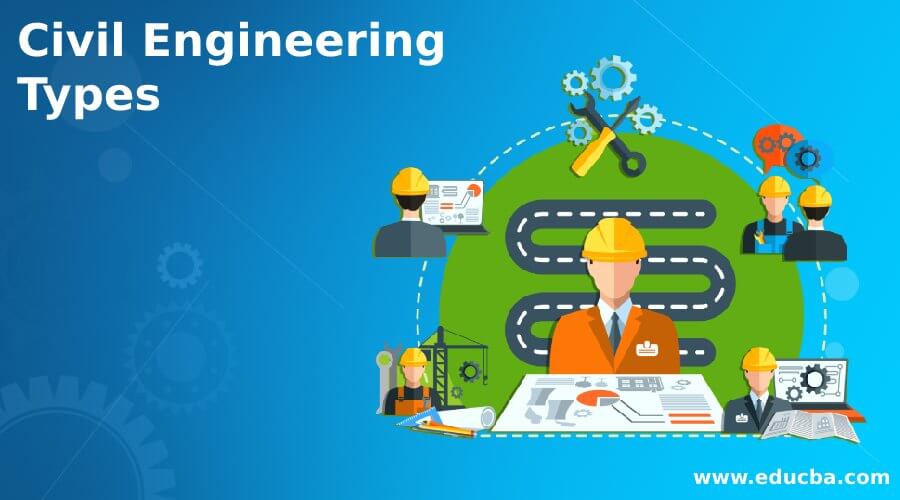Updated June 29, 2023
Introduction to Civil Engineering
The following article provides an outline for Civil Engineering Types. Worldwide, civil engineering is regarded as one of the most important engineering fields. Designing, managing, building, and maintaining infrastructure that plays a vital role in a country’s development & supports modern society are all part of this industry’s mission. A long list of construction projects is included in this category. As innovators in our societies, civil engineers are at the forefront. You can see that civil engineering is not solely concerned with the construction of physical structures.
Top 9 Types of Civil Engineering
Given below are the various civil engineering types:
1. Environmental Engineering
This sub-discipline focuses on conserving densely populated areas and preventing pollution from affecting the natural world. Environmental engineers analyze and develop solutions to a wide range of environmental problems. Solid waste treatment and management, water source purification, air quality improvement, and other tasks fall under their purview. To succeed in this field requires a solid understanding of atmospheric sciences and hydrology.
2. Geotechnical Engineering
Geotechnical Engineering is another essential civil engineering branch. They examine the rock and soil in an area where a civil structure is either already standing or is planned to be built in the future, and they perform analyses. To design structures and buildings safely, these engineers must be well-versed in soil science, material science, and the mechanics and hydraulics involved.
3. Transportation Engineering
As a civil engineering discipline, transportation engineering continues to be one of the most influential. They design, build and maintain all public transportation systems worldwide, including roads, rail lines (including commuter trains), ports and airports.
Through these initiatives, they aim to improve overall traffic flow, reduce traffic congestion, and reduce the risk of accidents occurring as much as possible. Alternatively, a new system can be designed or an existing system modified. As a result, engineers must consider various factors, such as the new system’s economic, political, and ethical impact.
4. Structural Engineering
Studying and analyzing the bridge, marine, flyover, and other building designs are part of structural engineering. In addition to being aesthetically pleasing, engineers must also ensure that the buildings are safe, durable, and serviceable. For this, it is necessary to identify the loads, forces, and stresses that may act on a structure. When engineers are designing a building, they must take into account several factors. Cost and constructability, for example, strength and stability, are all factors to consider. This includes earthquakes, floods, and aggressive winds.
5. Construction Engineering
Managing and supervising a construction project is the primary responsibility of a construction engineer. Planning and construction are only part of the process; materials transportation and site development are also included. In addition to evaluating logistical operations, they will likely be responsible for reviewing contracts and coordinating contractors daily. They must also ensure that projects are completed promptly and efficiently. A construction engineer is needed for any civil engineering project, whether it involves laying a new road or constructing a new building.
6. Mining Engineer
Oil, metals, and gas are just some natural resources a mining engineer is responsible for evaluating. They weigh these risk factors to determine whether it is safe to complete extraction at that site. In addition, mining engineers must determine the commercial value of a particular site.
7. Water Engineering
Water engineering studies how water interacts with infrastructure and how we can use it to our advantage. It focuses on ways to re-direct water flow in flood-like situations, properly storing water by building and using dams, and using engineering techniques to transmit groundwater and construct necessary waterways that can be useful in rural and urban settings.
8. Marine Engineering
Design, construction, and repair of ships and other aquatic equipment are the primary duties of marine engineers. This position requires an in-depth understanding of physics to create durable modes of transportation. This person could design and build a naval ship, yacht, or deep-sea drilling equipment with the help of a marine engineer.
9. Planning Engineer
A planning engineer is responsible for recommending the best construction tactics. By calculating the potential cost of a project and comparing it to the materials, manpower, and time required to complete it, they can make this determination. While maintaining a keen eye on safety standards, the planning engineer’s job involves finding and implementing cost-effective measures for a project’s implementation.
Conclusion
In this article, we have seen various types of civil engineering.
Recommended Articles
We hope that this EDUCBA information on “Civil Engineering Types” was beneficial to you. You can view EDUCBA’s recommended articles for more information.



